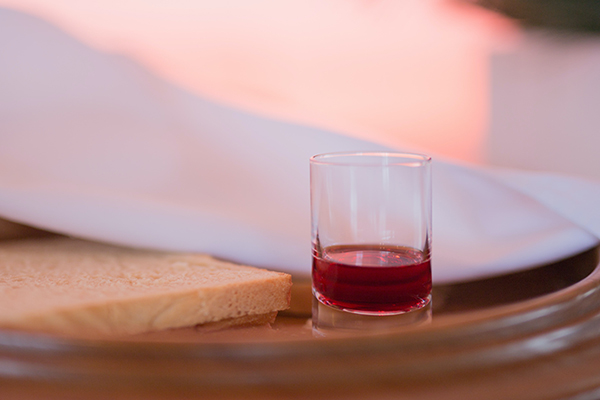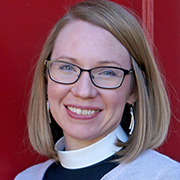by Emily K. Hartner
Our dining room table hasn’t been clear of clutter for months–since the beginning of the pandemic. Pre-COVID, we used it almost solely for eating. Now it has become a work table, a homework table, a craft table, a game table, and a puzzle table. It also remains a place to eat. When it’s dinner time, we shove the clutter to the end of the table to make room for our plates.
There’s a good chance something else might happen with our table this year. For the first time since it’s been in our house, it may very well become a Thanksgiving table. We’re doing our best to figure out a safe way to visit family for the holiday. Still, with a return to in-person school, the scheduling of COVID tests, and vulnerable family members, it might not be possible.
I’m working at church alone as I write this reflection. Earlier in the day, I wandered down to the sanctuary. Our windows are clear glass, so the morning light creates a beautiful glow — warm and inviting. But I felt a little sad, walking through that space. A space designed for gathering, it hasn’t been used since March. And the table? The one we used to gather around weekly to share in a meal of grace? Well, it looked lonely in the cavernous room.
 The table of Holy Communion is a thanksgiving table. Eucharist — the meal that happens at the table — is a Greek word for thanksgiving. It’s the place where we thank God for all that God has done for us through Jesus and throughout history.
The table of Holy Communion is a thanksgiving table. Eucharist — the meal that happens at the table — is a Greek word for thanksgiving. It’s the place where we thank God for all that God has done for us through Jesus and throughout history.
While I have grieved much over the past seven months, what I want to return to more than anything is the meal that God provides at that table. I want to look people in the eye again as I tell them that the small piece of bread and a tiny sip of wine is “for you.” I want to think of each of their stories as they approach the table. I want to ponder without judgment or expectation all the different stories that come to holy table. Holy food for holy people, we sometimes say.
But something interesting has happened since we began working — and worshiping — from home. Our homes have become our sanctuaries. Our dining room tables have become places of prayer and thanksgiving. In this switch from communion table to dining room table, does God call the many tasks that happen there holy? The work we do there is holy. The learning that happens there: holy. Holy describes the work, the nourishment, the fun.
An altar was once a place of sacrifice. It was the table on which you would place a sacrificial lamb to please the gods. It no longer carries that sense of sacrifice for those of us who believe that Jesus’ life was the ultimate sacrifice for us. However, I do believe that all the work, the play, and the meals that happen around dining room tables are pleasing to God as they represent our most faithful work. Our tables are holy, not because they are places of required sacrifice. But because they are where we can be ourselves and where God takes our work — our lives — and claims them as holy.
Our thanksgiving tables may look different this year. They may have a few empty chairs that we wish were filled. They may be graced with less food than in years past. But leave the clutter. Leave all the signs of that hard work you’ve been doing. You might even use the remnants of all that work as your placement. And then, when it’s time to say grace, give thanks. Give thanks not for what you have, but for the goodness of God, who claims all your messy work and calls it good.
Discussion questions:
1. Has COVID changed your Thanksgiving plans this year? If so, how?
2. What kind of holy work has taken place at your tables? Have you understood–or can you understand–it as holy?
3. How would you live your life differently if you knew God was claiming all of your work as holy?
Closing prayer
O God, you give each of us gifts to use to do your work in this world. Grace our tables of work, play, study, and meals so that we come to see our whole lives as being worthy of your love. In whatever work we do, use it to further your reign on this earth. Amen.
 The Rev. Emily K. Hartner is the pastor at Holy Trinity Lutheran Church in Charlotte, N.C. She lives in Charlotte with her husband, Ian, 4-year-old son, Oliver, and two French Bulldogs. In her free time (ha!), she enjoys reading and exercising. She currently also serves on the ELCA Church Council.
The Rev. Emily K. Hartner is the pastor at Holy Trinity Lutheran Church in Charlotte, N.C. She lives in Charlotte with her husband, Ian, 4-year-old son, Oliver, and two French Bulldogs. In her free time (ha!), she enjoys reading and exercising. She currently also serves on the ELCA Church Council.


Thank God for this message given to us by you. Truly HOLY and fit into our Gather magazine fall studies. Today I also give thanks for my HS Pat Hawley who was one of the first ten women to be ordained in the ELCA. A true Holy leader. She turned 80 on Oct. 30th.
Thank you Pastor Emily for your thought inspiring message for this trying year of Covid and quarantine. How blessed we are at Holy Trinity to have you as our Pastor!